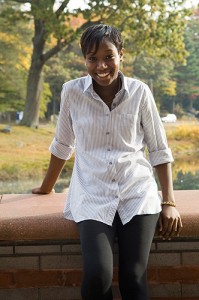
One year after an African American studies major was created in the College of Liberal Arts and Sciences, Paula McFarlane is about to become its first graduate.
McFarlane, from Bridgeport, Conn., who is also majoring in sociology, will finish her CLAS degree in December.
It was just last year that she added her second major.
Her interest in the new major began with a few African American studies classes and a trip aboard the Freedom Schooner Amistad in 2007. McFarlane and five other students spent a semester traveling to countries such as England and Portugal, learning about the trans-Atlantic slave trade.
Upon arriving back in the States, McFarlane met with history professor Jeffrey Ogbar, then director of the Institute for African American Studies and now associate dean of CLAS, to discuss her trip. McFarlane had already completed a minor in African American studies, and Ogbar informed her that the University had just created an African American studies major. She decided to pursue the additional classes needed to earn a second major in African American studies.
“I wanted to learn about a history that has affected my experience of race in this country,” McFarlane says. “It seems important in this day and age with Obama as president.” She says she was surprised the major had not been added earlier.
Ogbar played a key role in the inception of the African American studies major. He noticed the interest among students for African American classes and felt the major would give UConn a competitive edge. With the support of the CLAS Dean’s Office and the help of Willena Price, director of the African American Cultural Center, African American studies was first offered officially as a major in fall 2008.
McFarlane credits her trip abroad the Amistad for exposing her to an in-depth understanding of the trans-Atlantic slave trade.
During her senior year, at the same time she was immersed in African American history, McFarlane gave birth to her daughter Elise. She spent one week with Elise before returning to school so she could finish her studies in order to ensure a successful future for Elise and herself.
Having a daughter also helped McFarlane understand the significance of the milestone that she is a part of.
“It’s hard because Elise has two things working against her already,” McFarlane says. “I would hope that in the future people would judge her on what she can do, not on the fact that she’s a black woman.”
Ogbar says many influential people have graduated with a degree in African American studies and have gone on to diverse careers. For example, Mae Jemison, who obtained a B.S. in chemical engineering and a B.A. in African American studies at Stanford University in 1977, became the first African American female astronaut.
McFarlane plans to apply to both UConn and Brown University’s master’s degree programs in public policy. Her goal is to create public programs for disadvantaged populations.


